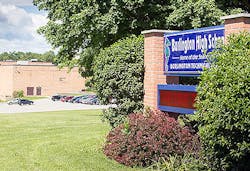More than 90 school districts in Vermont sue over chemical contamination
Dozens of Vermont school districts have sued the chemical company Monsanto over educational buildings contaminated by now-banned industrial chemicals known as PCBs.
The Associated Press reports that more than 90 school districts have filed suit in federal court. They’re seeking to recover costs and damages because schools in Vermont with high-enough contamination levels are required to reduce exposure.
Removing the PCBs will be expensive, and certain districts may have to demolish buildings and replace them with new ones — which in total could cost them “hundreds of millions, if not billions, of dollars,” the lawsuit contends.
Last year, Vermont became the first state to require older schools to test their indoor air for polychlorinated biphenyls, which were used in building materials and electrical equipment before 1980.
The PCBs are present in the school buildings from caulking and glazing compounds, sealants, adhesives, and other construction materials.
Monsanto said the case has no merit and that “third party companies, not Monsanto” produced the PCB-laden materials likely used at the schools.
PCBs were used in building materials and electrical equipment like transformers, capacitors and fluorescent lighting ballasts. The U.S. Environmental Protection Agency banned manufacturing and certain uses of them in 1979 over concerns they could cause cancer and other illnesses, according to the Vermont Department of Environmental Conservation.
PCB contamination forced Burlington High School in Burlington, Vt., to move into a vacant department store, where students have taken classes since March 2021 while the old school is being demolished. The Burlington district sued Monsanto in December 2022.
The Vermont attorney general also sued Monsanto last month over PCB contamination in Vermont’s schools and natural resources. The chemicals are highly persistent and continue to circulate in Vermont’s waters and other natural resources, and have accumulated to dangerous levels in sediment, wildlife and fish, according to the lawsuit. Vermont has a fish consumption advisory for all of Lake Champlain and the Hoosic River because of the contamination, the lawsuit states.
Monsanto also said that lawsuit had no merit for the same reasons it cited in the school districts’ case.
About the Author
Mike Kennedy
Senior Editor
Mike Kennedy, senior editor, has written for AS&U on a wide range of educational issues since 1999.
